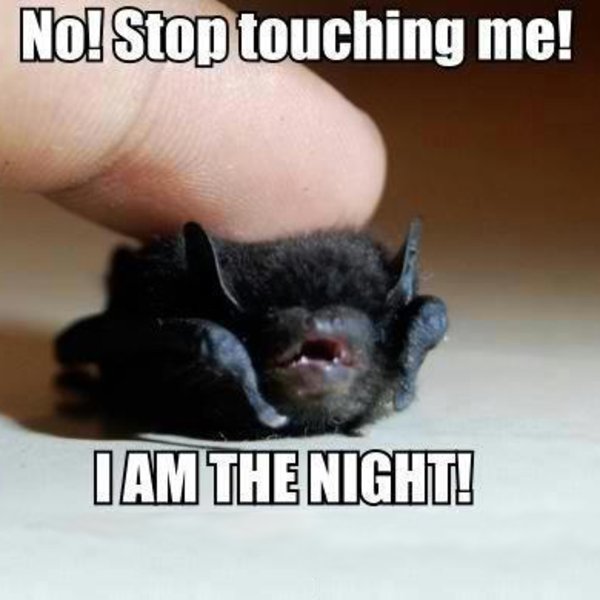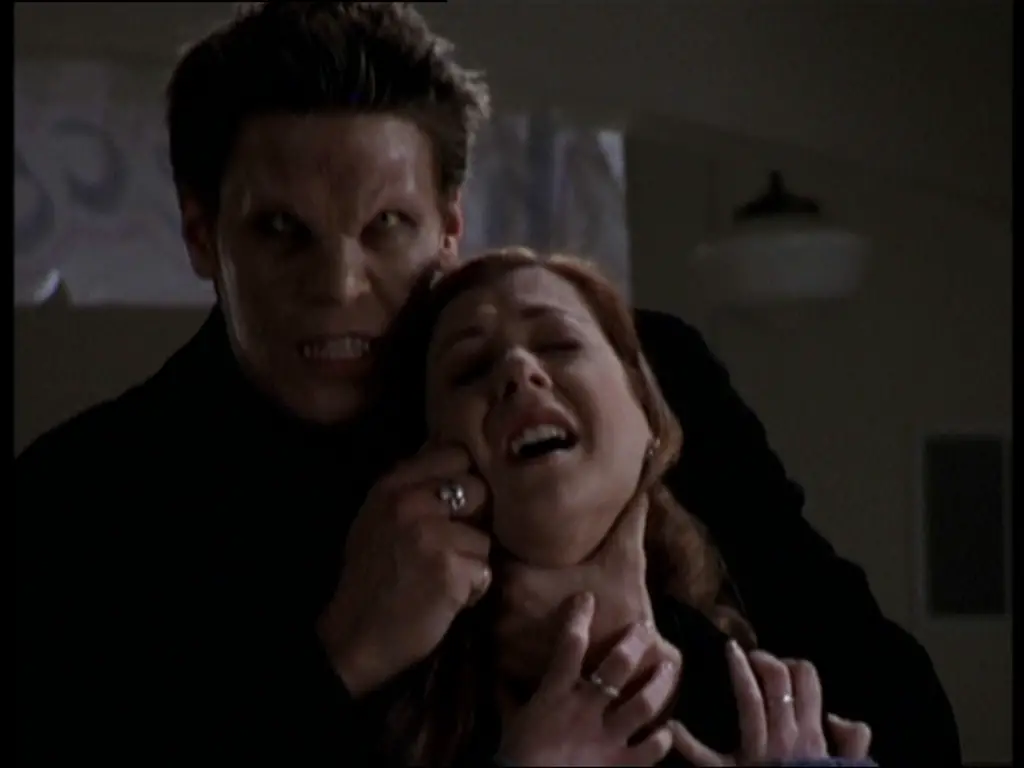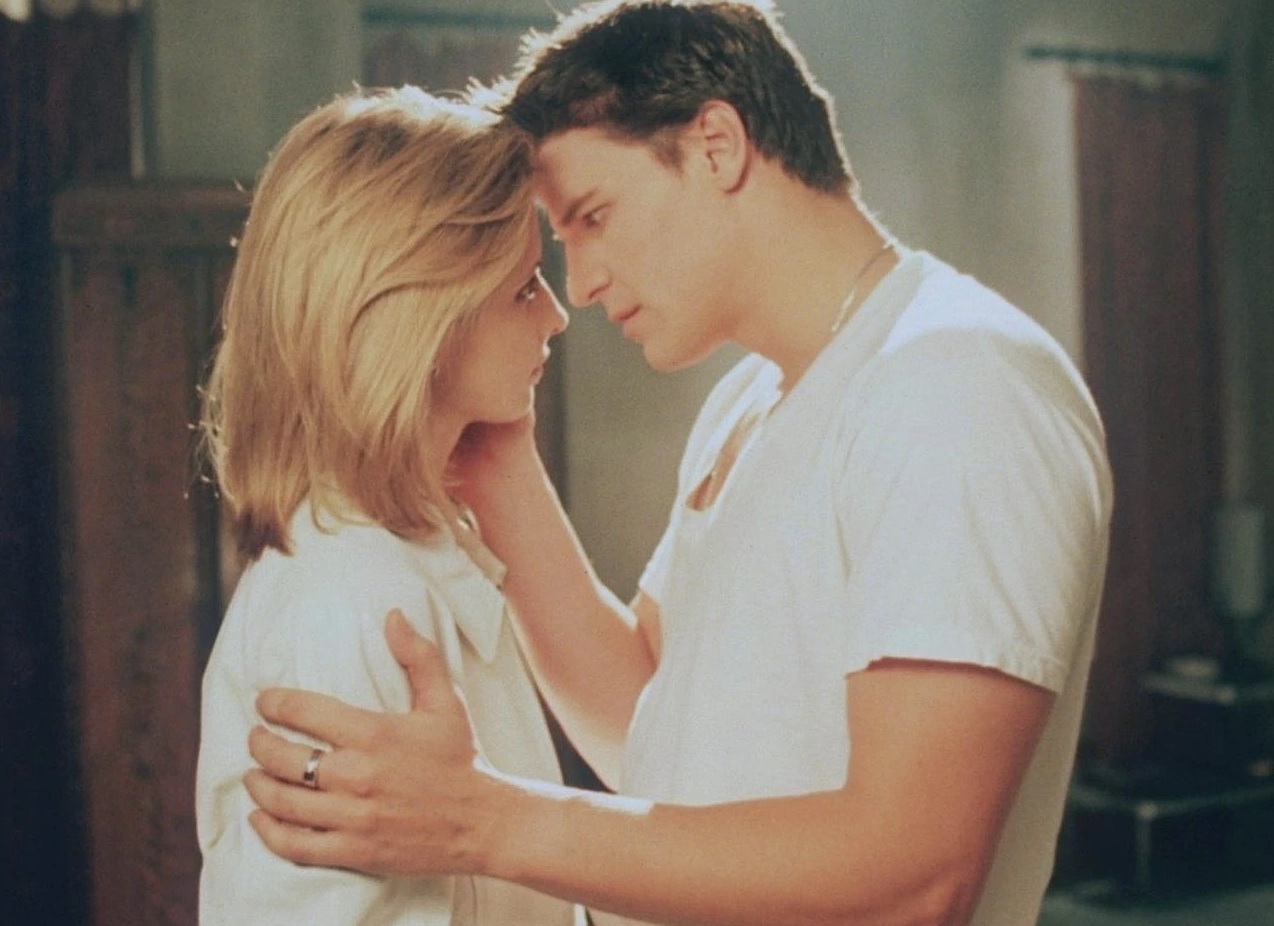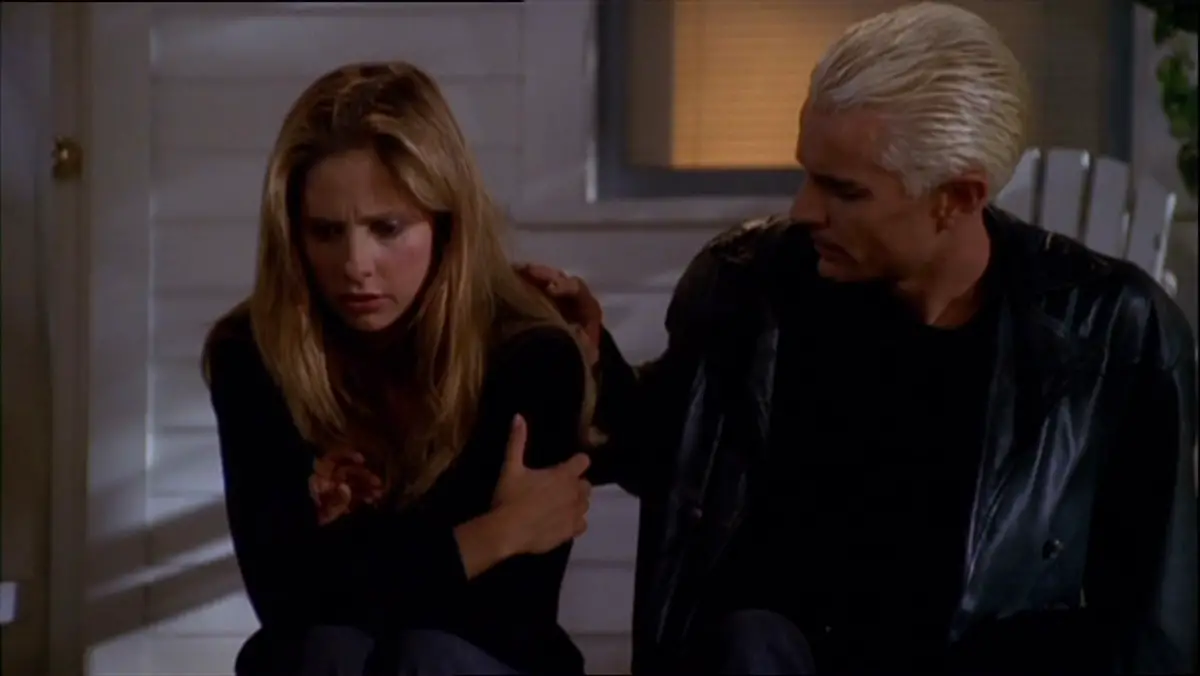This year, I have returned to the shows I know and love and which give me comfort, as many of us have. One of those for me is Buffy, the Vampire Slayer, which has retained its top spot as my favorite throughout the years. I revisit this show constantly, though admittedly, it is always choice episodes I come back to (I must re watch “Once more, with feeling” at least twice a year, for self-care, thank you very much).
It struck me recently that I had not rewatched the show in its entirety since maybe 2010. If there was ever a time to rectify that, it is 2020. So, I did, and I had… thoughts. I have so many thoughts. The first one I would like to discuss is how much my perspective on Angel and particularly Spike, has changed, and how much more complicated the comparison between them is than I originally chalked it up to be.
Spoiler warning for all seven seasons of Buffy.
TW: Sexual assault
The Vampire and the Human
Before there was Edward and Bella, there was Buffy and Angel. Unlike the former, the latter did not get their happy ending. After they parted, Buffy became entangled with another vampire, Spike, in a relationship much more contentious. There was a human there in between, but almost no one talks about him. Poor Riley, he was a nice slice of white bread.
Buffy, the Vampire Slayer was a pioneer in television in many ways. It featured a woman in the lead who defied the dichotomy of girly girl vs tomboy action girl. In later seasons, it was one of the first to be truly serialized television. It was also, arguably, a trailblazer in the vampire/human romance. I am not about to slam vampire/human shenanigans. In fact, I admit I have a bit of a weakness for them, even though I recognize the inherent ickiness of it. I do tend to object to adults courting and dating teenagers, though, and that contributes to my continued dislike towards the Buffy and Angel pairing particularly. We do not like to see it.
Buffy is not a perfect show by any means. Plenty before me have pointed out its issues, particularly regarding race and its unfortunate stumble into the Bury Your Gays trope. And let us not get into the Joss Whedon-sized elephant in the room. However, in a lot of ways, Buffy was more self-aware than many shows are today, particularly when it comes to Buffy’s relationship with the two vampires. The show knows how screwed up these entanglements are, and both are doomed in the end.
It is interesting that we have been comparing Buffy’s relationships to Angel and Spike, when not only are they entirely different as people, but the genesis and nature of both is miles apart. It struck me as I reached season 5. I and so much of the fandom (not everyone, I know) have been taking about Angel and Spike in the same terms for years when there is a fundamental difference going into their relationship with Buffy: their souls.
In this article, I will be discussing only the seven seasons of Buffy, leaving out the further comics and the Angel spin-off show.
Buffy’s Vampire Lore
In the Buffy universe, vampires are undead, soulless demons. The soul is the essence of a person, which among other things, contains their conscience. Once a human is turned into a vampire, they are no longer governed by human standards of right and wrong.
What is special about Angel initially is that he is a vampire with a soul. Clan Kalderash of the Romani people cursed Angelus—as he went by those days—with his soul after he killed a member of their family. Angel is doomed to live with the guilt of the horrible things he did as a vampire.
The treatment of Angel in the first three seasons of Buffy questions whether the person they were before they turned can be held accountable for the actions of the demon they become.
“When you become a vampire, the demon takes your body, but it doesn’t get your soul.”
-Angel
When Angel loses his soul, he becomes utterly unrecognizable. He kills people, including Giles’s girlfriend, Jenny. He also tortures Buffy relentlessly, intent on making her life miserable. He seems to be mad that she had had so much hold over him before. It all culminates in Buffy making the hard decision to kill him, as there is seemingly no way back for him. Just before she does, he comes to thanks to a spell performed by Willow. He seems to be completely unaware for a moment of what he has done, once again making the point that perhaps the demon and the man can be separated.
Spike does not have a soul when he starts his affair with Buffy. Not when he declares his love for her, or when he goes to bat for her and Dawn against Glory, or when he takes care of Dawn after Buffy dies. Spike also invades her personal space by going into her house and stealing her clothes, makes a sex robot in her likeness, engages in a toxic relationship with her sexually, and (TW: sexual assault) when Buffy tries to end it, Spike outright assaults and tries to rape her.
Spike ain’t no sunshine. While he has plenty of comedic and redeemable moments, many of his actions are gross and absolutely indefensible. And then, he goes and gets his soul back.
While Buffy got a lot right in capturing the nature and the problems of both these relationships in the moment they happened, it also muddled the waters a lot in terms of which vampires are redeemable and how we are meant to read their actions.
The Confusing Double Standard
Calling Spike vs. Angel a shipping war would be inaccurate, as this all happened before that term made it to common fandom language, though it’s still a useful approximation. There certainly was a spike (LOL) in Spike’s popularity after Angel left for his spin-off and Spike became a regular character on Buffy.
Spike was always a bit of a showboat regarding his power, but often portrayed as a wimp, especially when compared to Angelus and even Drusilla, his centuries-long girlfriend. Spike shows the capacity for emotional attachment from the start with Drusilla. He does not seem to fall in love so much as get infatuated.
To justify Buffy having an ongoing relationship with a vampire without constantly going for the kill (on both ends), the show introduces the chip in season 4. A government military faction called The Initiative captures Spike and inserts a chip in his brain that prevents him from so much as attempting to harm humans. This effectively neuters him. Buffy and co. consider it now unethical to kill Spike since he is harmless.
Here is where we run into the first problem. Spike is a soulless demon at this point, who has killed many without remorse. Even though he is harmless, for all intents and purposes he is not a man. Yet Buffy herself shows that she can look at a vampire as something more than a demon in her choice not to kill Spike.
Later, she is disgusted at the prospect of Spike being in love with her, and denies it is even a possibility. Spike does, however, betray Drusilla for her. Then he gets a Buffy a sex bot. But then, he conceals the information about Dawn while being tortured, in the same episode.
Angel is drawn as uncomplicated good or evil, as Angel or Angelus, respectively. He is either the demon of the vampire with a human soul. Spike is not. It is unclear to me whether he is truly capable of loving Buffy, but some of his other relationships seem genuine. He seems to like Joyce and care for Dawn. Even his brief intervention to save Tara from her family seems genuine, despite his insistence that he doesn’t care about any of them.
Dawn: “I feel safe with you”
Spike: *sputters* “Take that back!”

Credit: I have no idea who created this meme, but well done.
Does the Vampire Reflect the Human?
This leads me to the question: Does the vampire they become reflect the human these people were? The show seems undecided.
With Willow and Angel, for example, it seems to suggest, not much. The demon takes over, and there is hardly a shadow of the human left. Both are almost unrecognizable and undeniably evil. Though there are small aspects that remain, like Willow’s need for validation from superiors and Angel’s… intensity, I suppose. Though Liam, the man he was before he was turned, seemed to be a drunken player, from what little we got to see of him on Buffy. Frankly, there isn’t too much to go on there, so I am really comparing Angelus with Angel when he has a soul.

Then there is Hope. She remains the same as she was as a human. She doesn not seem to be evil so much as mean. In her guest appearances on Buffy, she seems to be trying hard to be evil to fit in with the vampires, in the same way she tried had to fit in with the popular crew as a human.
As for Spike, it is not until season 5 that we get our look at who he was as a human. William was a soft-spoken, lovelorn puppy and a mamma’s boy. Everyone makes fun of his poems, and later the woman he loves rejects him, and he goes off to cry in a corner. He also suffers from a bit of Nice Guy Syndrome. Drusilla finds him, validates him a little bit, and he is a goner. This aligns pretty well with who Spike becomes as a vampire.
Spike proves capable of crying as a vampire, when Buffy echoes the words spoken by his 19th century crush. This not only proves he has feelings, but that those feelings can still echo who he used to be.
“You are beneath me”
Buffy to Spike
So, does the vampire reflect the human? Seems so. If so, this makes Angel (and Willow) look not so great. Angelus, as portrayed in Buffy, seems to be pure evil. Even the strange blue demon they summoned in season 2 said it detected more humanity in Drusilla and Spike than in Angelus.
Ensoulment
For me, the most interesting part in all of this, are the dynamics of losing and recovering souls that both Angel and Spike go through.
Both times Angel recovers his soul against his will. First, he is punished by the clan, the second time he is “saved” by Willow, albeit too late. When he has his soul, he is broody and serious, he suffers in silence but does not want to lose it. He goes on about how he’s not good enough a lot. He does dedicate his energy to try to right his wrongs, for the most part.
For Spike, it is very different. After his assault on Buffy, he is self-aware enough to reaize what he’s done, and he decides to get his soul back. His motives are not completely unselfish. He thinks by getting his soul back it will be a magic fix and Buffy will want him like she did Angel. Yet after he does, he cannot bring himself to face her and tries to claw it out of himself. He stews in guilt while simultaneously he is tormented by The First evil, which drives him mad. Buffy does see the change in him and tries to help him recover, though it takes time before she can trust him.
Full disclosure, I have never been an Angel fan. With Spike, I have gone back and forth. I used to dislike him a lot as a teenager and in my early twenties. I do recognize him now as a character who fascinates me, and at least in Buffy, I find there is a lot more to say and pick apart with Spike than with Angel, for me. I’m sure there are others out there who could write a dissertation on Angel, but that is the beauty of media consumption and analysis.
Perspectives on Forgiveness
When someone does something bad to you, and they repent, you can choose to forgive them or not. However, even if you do, you are under no obligation to let them back into your life. They should be able to move on with their lives, forgiven or not, but repentant (mind you, I’m talking about common offenses here, not crime). They can be better to the next person they meet, and be deserving of their love, and to be in their lives. It might still be hard for the wronged to see that, though, while the new people in their lives can more easily forgive the fact that they have made mistakes in the past.
The audience (and Buffy) tends to forgive Angel more easily because the terrible things he has been punished for were not done to her. We didn’t see his 100 years of evil. And even after he becomes a monster, it is “against his will,” technically. Though Giles and Xander might disagree vehemently there.
It is harder to forgive Spike for what he did because we saw it, and he did it to the gang. Particularly that last act at the end of season 6 becomes burned into our retinas. It would certainly be well within Buffy’s rights to never forgive Spike for what he did to her, even after he has gotten his soul back. Just as some other characters never did. Just like it was within the rights of the Kalderash Clan not to forgive Angel.
Yet at the time, perhaps a lot of us saw the Clan’s relentless wish to punish Angel as cruel. We first meet him with a soul, and that inevitably colors the audience’s and Buffy’s own perception of Angelus’s actions before and after.

With Spike, it is a whole other thing. We first meet him soulless, but his alignment with the Scooby Gang is gradual. He has bad, awful moments, but also good moments in the lead-up to his ensoulment. What happens to me all the way back since I first watched the show, I realized, is that I tend to forget Spike does not have a soul through all this, up until I get to the end of season 6, when he goes to retrieve it.
I suppose it’s fitting for a show that started out for younger audiences to feature conflicts more uncomplicated and then move on to the complex mind twist that is the Buffy and Spike relationship.
Angel is star-crossed lovers’ drama, infatuation and first love. The angst between Buffy and Angel would put some fanfic writers to shame. They are both longing for each other for the longest time, but chastising themselves because their relationship is of the most forbidden nature. It would all be fascinating to me if Buffy wasn’t sixteen.
Spike is power-play, hurt-comfort laced with abuse. Buffy takes advantage of Spike’s feelings for her, and later he takes advantage of her trauma and depression. Being with Spike is part of Buffy figuring herself out as an adult, and as a slayer, testing out her power. Sometimes it is an act of self-hate of her. It is utterly toxic, and the road to it becoming a respectful, reciprocal relationship is a long and tough one. It is a much more adult conflict for a more adult Buffy.

To what I said earlier, I do believe the show acknowledges the inherent problematic nature of both relationships. It does do a better job, though, of exploring the toxicity of Buffy’s relationship with Spike and the complication and nuance of him getting his soul back and crashing back into her life.
When you look at the show, it feels like they dropped the ball a bit with Angel and then decided to explore the concept of souls more thoroughly with Spike. But as I said earlier, I also think it was a symptom of the show becoming more mature as the years went by for both audience and characters. I suppose I am personally willing to give the show a chance with its muddled waters of vampire lore for that reason.
Is There a Conclusion?
I do believe Spike, in the end at least, loved Buffy. But like him, I am not convinced she loved him. Ultimately, Buffy is only 22 years old when the show ends. All her relationships have been laced with drama and stakes higher than most, being who she is. Like she herself said, she is cookies, and she is not done baking yet. But I do think her relationship with both these vampires, her sworn enemies, were fundamental in shaping the way she sees love and her own power as a slayer. They are certainly interesting to watch.
All in all, my personal verdict is that despite its shortcomings in some departments, including its double standards when it comes to vampires and souls, Buffy holds up, and there is still a lot to analyze and talk about regarding its characters even 17 years after it ended. If you have not given it a shot… first, what are you doing getting to the end of this? It is ripe with spoilers! Second, it is very much worth a watch! You can catch it on Facebook Watch in the US and on Prime Video in Mexico.
After you watch it, I would love to read your thoughts on the whole Angel and Spike debate in over on our Discord server.
Images courtesy of 20thTelevison/The WB/UPN.
Have strong thoughts about this piece you need to share? Or maybe there’s something else on your mind you’re wanting to talk about with fellow Fandomentals? Head on over to our Community server to join in the conversation!

